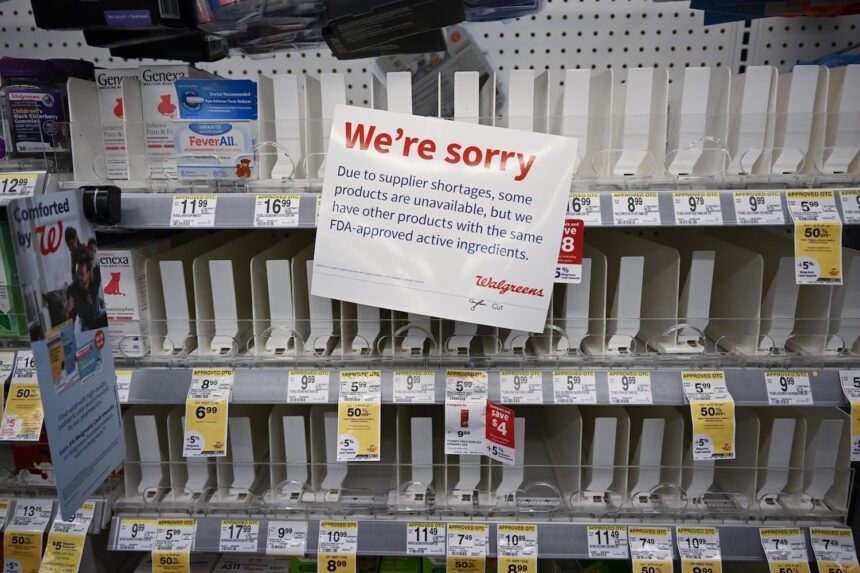Johnson & Johnson, one of the largest pharmaceutical and medical device companies in the world, says it’s planning for about $400 million in additional costs related to President Donald Trump’s tariffs, which seem to change by the hour. Incredibly, those additional costs don’t even include plans yet for Trump’s tariffs on pharmaceutical products, which the president has repeatedly said he’s going to impose soon.
Johnson & Johnson beat revenue expectations, up 2.4% to $21.89 billion according to earnings reported Tuesday, with profit of $11 billion in the first quarter, up from $3.26 billion a year earlier. But the company told analysts on a conference call Tuesday that tariffs on Canada and Mexico, along with tariffs on steel and aluminum, must be planned for. The tariffs will be felt “broadly,” rather than in just one area of the company’s portfolio, according to CNBC, with some of the biggest impacts felt on products actually getting shipped from the U.S. to China, which has imposed reciprocal tariffs.
Executives at Johnson & Johnson are very publicly signaling to Trump that they want lower taxes to help offset the costs of the tariffs, with CFO Joseph Wolk appearing on CNBC Tuesday to argue that tax cuts are great for business. Asked by CNBC host Joe Kernen, a supporter of Donald Trump, whether the president’s policies had inspired Wolk to invest more in the U.S., the CFO credited Trump’s 2017 tax cuts.
CEO Joaquin Duato said something similar during his call with analysts Tuesday, according to the Wall Street Journal. “If what you want is to build manufacturing capacity in the U.S., both in medtech and in pharmaceuticals, the most effective answer is not tariffs, but tax policy,” Duato said.
Trump is trying to usher in an extension of the 2017 tax cuts and the Republican budget blueprint passed the House last week. But there are still some conservative Republicans who don’t think the budget cuts enough in vital services.
Even if the U.S. goes into recession thanks to Trump’s policies, Johnson & Johnson says it’s well positioned to weather rough times since the healthcare industry is more “recession-proof,” according to the Journal. After all, nobody really wants to get sick. And given the fundamentally broken nature of the U.S. healthcare system, there’s not much in the way of consumer choice. Pay up or die.
And just to add more chaos to the mix, Trump has said he wants tariffs on pharmaceuticals imported into the U.S., something that he believes will bring more manufacturing jobs to American shores. There’s also the national security argument that being too reliant on foreign supply chains makes the U.S. vulnerable, something that’s not altogether wrong since Trump is turning all of America’s traditional geopolitical friends into enemies.
The Secretary of Commerce filed a notice on Monday saying that a Section 232 investigation was underway to examine whether drug imports posed any risk to national security. Trump has previously used Section 232, a provision of the Trade Expansion Act of 1962, to slap tariffs on lumber and cars under the guise of national security. The “national security” threat, as it were, is supposedly the U.S. trade deficit with other countries.
Dr. Scott Gottlieb, Trump’s FDA commissioner during his first term, explained on CNBC that generic drugs will actually be the hardest hit by tariffs, and given the slimmer margins on such drugs, many companies will likely pull out of manufacturing for those medications, leading to potential shortages.
“When it comes to the generic medicines, they don’t have a lot of cushion. And I think a lot of these generic manufacturers are going to get out of these markets if tariffs are imposed on them. And then we’re going to have drug shortages here,” Gottlieb said. “So the very problem they’re trying to solve, which is the national security issue related to this 232 provision that they’re trying to use, is the one that’s going to be the least amenable to using this tool.”
Many of the drugs the U.S. imports are actually coming from Ireland, where large manufacturers have set up thanks to tax incentives. But Gottlieb, who also sits on the board of Pfizer, said that there are substantial benefits to moving out of Europe which has better protections for workers and higher energy costs. Especially when it’s production of higher margin “branded” drugs as opposed to generics.
“When you look at the branded companies that are manufacturing these high-margin products over in Ireland, they would be willing to bring a lot of that manufacturing back to the U.S.” Gottlieb said. “And in fact, you’ve seen Lilly and Novartis make announcements in recent weeks that they’re bringing a substantial portion of that manufacturing back because quite frankly the tax advantage of manufacturing in Ireland isn’t that substantial relative to bringing your manufacturing back to the U.S. and having more control over it.”
Gottlieb noted that it’s much easier to hire labor in the U.S., without explaining that one of those reasons is that workers in other wealthy countries like Ireland aren’t working “at will” meaning they can be fired at any time for any reason.
“It’s easier to hire labor here,” Gottlieb continued. “The two biggest inputs in manufacturing are the labor costs and the energy costs. Energy is cheaper here. So the increased benefit they get from moving it to Ireland because of the tax treatment, it isn’t fully offset by those other advantages, but it’s offset enough that they’d be willing to do it.”
For its part, Big Pharma is lobbying the Trump regime to either phase in any pharmaceutical tariffs slowly or create exemptions for certain types of products, according to the New York Times. And while it’s possible that some drug companies will just temporarily eat some of the costs of tariffs given the existing contracts that have already been signed, there are signals that those same companies would just pull back on medical research budgets in the U.S. to make up for it, as David Ricks, the CEO of Eli Lily, told the BBC earlier this month.
“We can’t breach those agreements so we have to eat the cost of the tariffs and make trade-offs within our own companies,” Ricks said. “Typically that will be in reduction of staff or research and development (R&D) and I predict R&D will come first. That’s a disappointing outcome.”
Read the full article here











